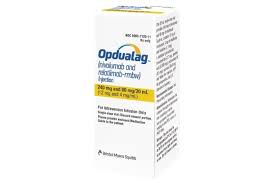
In March, the US Food and Drug Administration approved Opdualag, the first new checkpoint inhibitor mechanism of action to gain approval as a therapeutic target since BMS’s PD-1 inhibitor Opdivo (nivolumab) reached the market in 2014. Moreover, the new checkpoint target is only the fourth to gain approval since 2011 (after CTLA-4, PD-1, and PD-L1). Opdualag, developed by Bristol Myers Squibb (BMS), is a fixed dose combination product of relatlimab – which inhibits the new checkpoint target on T cells, called LAG-3 – and Opdivo. The agency granted approval to Opdualag for first-line use in the treatment of metastatic melanoma and melanoma that cannot be treated via surgery.
Inhibitors of LAG-3, like other checkpoint inhibitors, are designed to take the brakes off the immune system, restoring T cell anti-tumor activity. BMS found that relatlimab had little single-agent anticancer activity, and so chose not to develop the inhibitor on its own. However, as LAG-3 and PD-1 are both expressed on T cells and dampen T cell activity in response to certain chemical signals in the tumor microenvironment, the company theorized that inhibiting both checkpoint proteins could overcome PD-1 resistance and lead to higher T cell activity than blocking just one of the checkpoints. That theory was proven correct. Results of the pivotal Phase 2/3 RELATIVITY-047 trial in Stage III and Stage IV melanoma patients, which supported Opdualag’s approval, showed a significant improvement in median progression-free survival versus Opdivo alone – 10 months for Opdualag versus 4.6 months for single-agent Opdivo. While Opdualag was associated with a higher percentage of adverse events than Opdivo alone (21.1% versus 11.1%), the combination treatment showed lower toxicity than the 59% adverse event rate seen in the CHECKMATE-067 trial of Opdivo plus Yervoy (BMS’s CTLA-4 inhibitor, ipilimumab).
BMS’s strategy of commercializing its LAG-3 inhibitor as a fixed-dose with Opdivo is an interesting one. Industry watchers have long questioned whether the FDA would require demonstration of single-agent activity to grant approval to a new candidate immunotherapy. Opdualag’s approval indicates that will not necessarily be the case. Moreover, Opdualag’s approval as a fixed-dose regimen effectively prevents physicians from simply replacing Opdivo in the LAG-3/PD-1 combination with Keytruda (pembrolizumab), which is also approved for first-line use in melanoma. While experts say that Opdualag is likely to reduce sales of Yervoy, given the higher toxicity of an Opdivo/Yervoy combination, BMS’s overall goal is to get all melanoma patients eligible for first-line treatment onto a dual treatment regimen.
BMS is also exploring other applications of LAG-3/PD-1 inhibition, conducting a variety of trials of Opdualag in lung, colorectal, and liver cancer indications. Several other companies are also developing LAG-3 checkpoint inhibitors, most notably Regeneron (REGN3767 with LIBTAYO/cemiplimab) and others in skin cancers, and Merck (Favezelimab with Keytruda) in metastatic colorectal cancer.
LAG-3 targeting treatments are not the only new checkpoint inhibitors in the pipeline. The success of the first checkpoint inhibitors spurred considerable research investment in finding new checkpoint targets. As a result, over 100 clinical and preclinical development programs are underway, exploring a variety of potential targets and strategies, from drug combinations to fusion proteins to bi-specific antibodies and other structures. Development efforts against specific targets have risen or fallen over time, as clinical setbacks and toxicity issues emerged. However, several therapeutic candidates are now in advanced stages of clinical testing against new checkpoint proteins including TIM3 and TIGIT.
For example, the Genentech unit of Roche is expecting to release Phase 3 results in non-small cell lung cancer (NSCLC) in mid-2022, with their anti-TIGIT monoclonal antibody, tiragolumab (which failed its Phase 3 trial in extensive-stage small cell lung cancer), both as a single agent and in combination with Roche’s anti-PD-L1 drug Tecentriq (atezolizumab). BMS also has additional checkpoint antibodies in their pipeline, targeting TIGIT and TIM3, as well as a next-generation CTLA-4 blocker. Moreover, Merck is testing fixed dose combinations pairing Keytruda with its TIGIT inhibitor vibostolimab (Phase 3 trials in NSCLC and extensive-stage lung cancer), and the company’s own next-generation CTLA-4 inhibitor quavonlimab (Phase 3 trial in metastatic colorectal cancer).